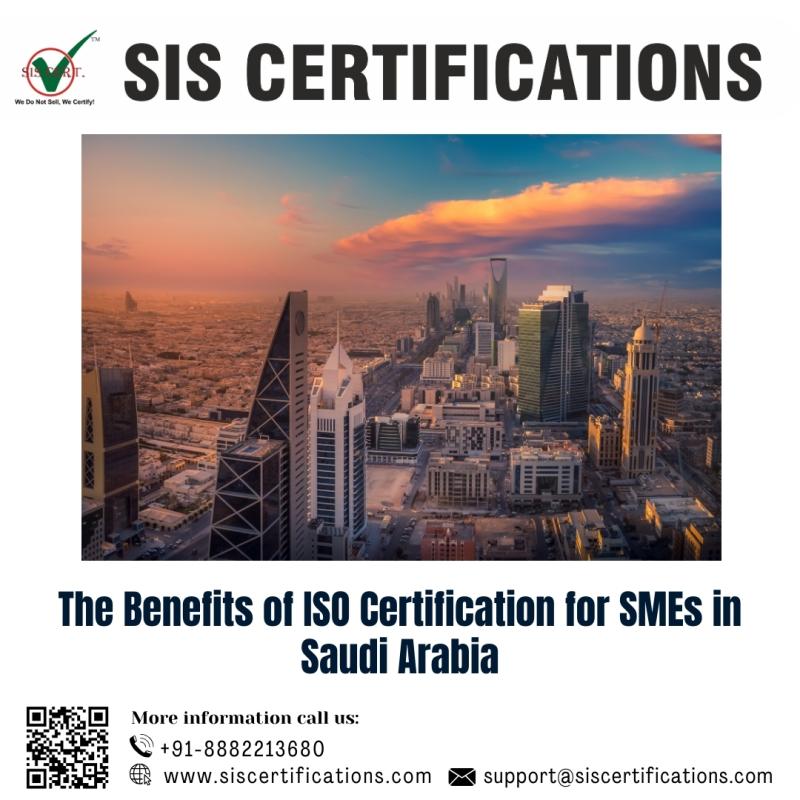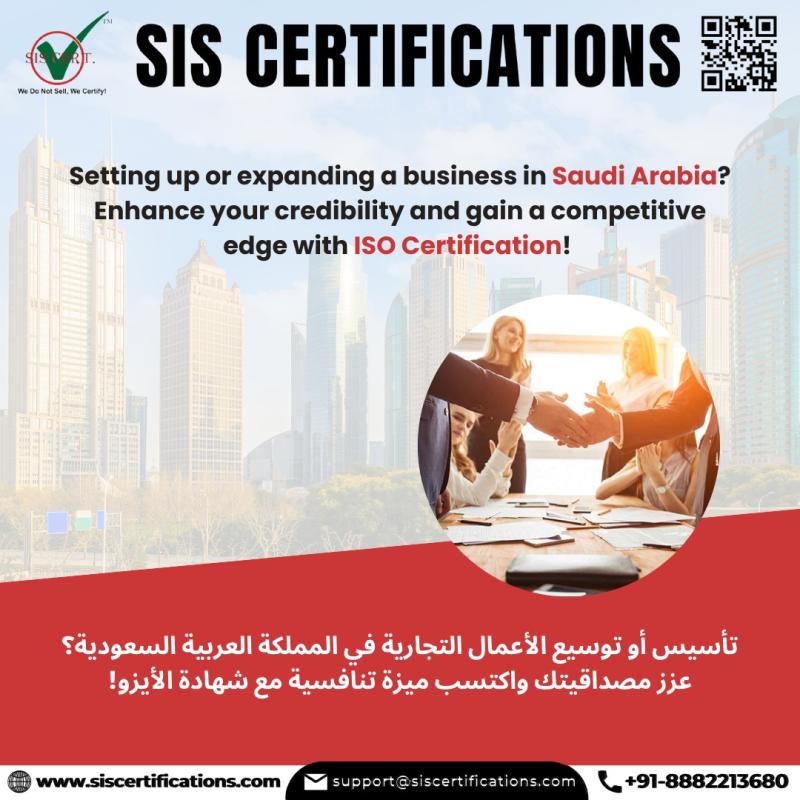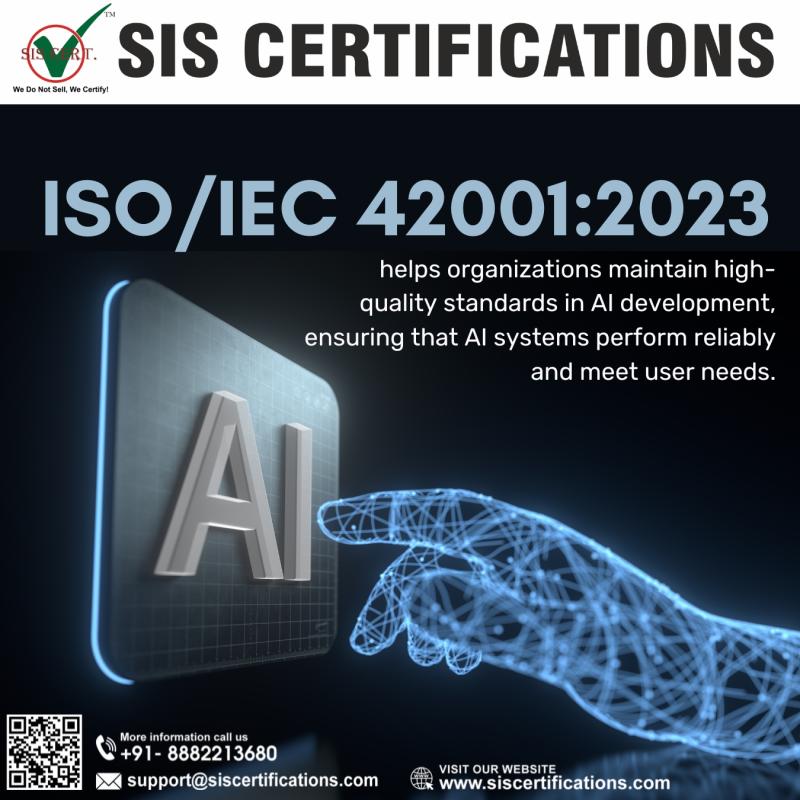The Benefits of ISO Certification for SMEs in Saudi Arabia

In Saudi Arabia’s rapidly
evolving economic landscape, small and medium-sized enterprises (SMEs) are
increasingly recognized as crucial drivers of growth and innovation. As these
businesses strive to enhance their competitiveness and credibility, ISO certification
emerges as a valuable tool. ISO, the International Organization for
Standardization, offers a range of certifications that can significantly
benefit SMEs. This article explores the key advantages of ISO
certification for SMEs in Saudi Arabia and how it can foster their
success.
1. Enhanced Credibility and
Market Access
ISO certification provides SMEs
with an internationally recognized stamp of quality and reliability. For
businesses in Saudi Arabia aiming to compete both locally and globally, ISO
certification serves as a mark of trust and excellence. Certifications such as ISO
9001 (Quality Management Systems) can enhance a company’s credibility by
demonstrating adherence to high standards of quality. This can be particularly
advantageous when bidding for contracts or forming partnerships with larger
organizations that require ISO certification from their suppliers.
2. Improved Operational
Efficiency
One of the primary benefits of
ISO certification is the improvement in operational efficiency. Implementing
ISO standards requires SMEs to streamline their processes, establish clear
procedures, and focus on continuous improvement. For instance, ISO
9001 in Saudi Arabia promotes
the adoption of quality management practices that can lead to reduced waste,
optimized resource use, and more efficient operations. By standardizing
processes and embracing a systematic approach, SMEs can enhance productivity,
reduce errors, and ultimately lower operational costs.
3. Increased Customer
Satisfaction
Customer satisfaction is a key
driver of business success, and ISO certification can significantly contribute
to achieving higher levels of customer satisfaction. ISO 9001, in
particular, emphasizes understanding and meeting customer requirements, which
can lead to improved product or service quality. By adhering to internationally
recognized standards, SMEs can better address customer needs, respond to
feedback, and deliver consistent results. This focus on quality and customer
service helps build stronger relationships with clients and fosters long-term
loyalty.
4. Enhanced Risk Management
Effective risk management is
crucial for business continuity and resilience. ISO certifications, such as ISO
31000 (Risk Management), provide frameworks for identifying, assessing, and
mitigating risks. For SMEs in Saudi Arabia, adopting such standards can help in
proactively managing potential threats and minimizing their impact. By
integrating risk management practices into their operations, SMEs can better
prepare for uncertainties, protect their assets, and ensure business continuity
in the face of disruptions.
5. Better Compliance with
Regulatory Requirements
Navigating regulatory
requirements can be challenging for SMEs, especially in a market as dynamic as
Saudi Arabia. ISO certification helps ensure that businesses comply with
relevant regulations and standards. For example, ISO 14001
(Environmental Management Systems) helps SMEs adhere to environmental
regulations, while ISO 45001 (Occupational Health and Safety) ensures
compliance with health and safety laws. By achieving ISO certification, SMEs
can avoid legal pitfalls, reduce the risk of non-compliance penalties, and
demonstrate their commitment to regulatory adherence.
6. Competitive Advantage
In a competitive market,
differentiation is key. ISO certification provides SMEs with a significant
competitive edge by showcasing their commitment to quality, efficiency, and
customer satisfaction. This certification can be a powerful marketing tool, helping
businesses stand out from competitors and attract new clients. Additionally,
the structured approach promoted by ISO standards encourages innovation and
continuous improvement, which can further enhance a company’s competitive
position.
Conclusion
For SMEs in Saudi Arabia, ISO
certification offers a range of benefits that can drive business success and
growth. From enhancing credibility and improving operational efficiency to
increasing customer satisfaction and managing risks, the advantages of ISO
certification are substantial. As the Saudi Arabian market continues to evolve,
SMEs that invest in ISO certification will be better equipped to navigate
challenges, seize opportunities, and achieve long-term success. By aligning
with international standards, SMEs can strengthen their market position and
contribute to the Kingdom’s vision for a vibrant and diversified economy.








Comments